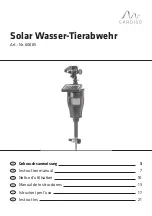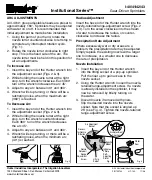
©Abundant Flow Water Systems, Inc. 2009
Revised 9/09
[6]
2.
The hole position on the pipe should be marked and drilled
with a 1/4" bit. If using a horizontal pipe, ensure the hole is
made on the top of the pipe, so that standing water in the
pipe will not leak into the drain saddle.
NOTE:
Drill through
one side of the pipe only!
3.
Take the backing off of the rubber seal, center over the
hole just drilled, and stick in place.
4.
Position the half of the drain saddle with the fitting (the
fitting half) over the hole in the drain pipe, then position the
other half (the back half) of the drain saddle on the opposite side of
the drain. Place one of the bolts through the fitting half through the
back half and loosely thread the nut onto it. Repeat on the other side.
Position the fitting on the fitting half of the saddle over the drilled hole and seal, and evenly tighten
both nuts, being careful not to over tighten. Once your system is set up, the drain line will connect to
the drain saddle (Figure 4).
Connecting the system:
Once the faucet is installed, the tank is in place, the feed water adapter is in place, the drain saddle is
positioned, and the system location had been determined, the system is ready to be hooked up. To
make future filter changes easier, we recommend positioning the system in a location where filters can
be changed, (such as in front of the kitchen cabinet if installing under the kitchen sink) and hooking the
system up there, simply wrapping the extra tubing up and putting the system away during normal use.
This will allow you to pull the system out to change filters and will save time since the system will not
have to be unhooked.
Using the following pictures and descriptions and the color coded tubing to make the connections to the
system. Note: The pictures show blue plugs to make the connection easier to see, your system should
have color coded tubing inserted in them.
Please Note
: Pictures are for reference only, actual fitting design and location may vary. The
connection is described and color coded tubing is used to make things as easy as possible. If still
unsure, feel free to contact us for assistance.
Feed Water Line –
RED
Connects from the feed water ball valve (connected to the “IN” on the first (clear) filter
housing with the white sediment filter in it) to the angle ball valve on the feed water adapter.
To connect, place the nut on the line, push the line over the barb on the angle valve and
tighten the nut.
Tank Line – CLEA
R
Connects from the T-fitting (either on the inline post filter or the DI filter, depending on the
system) to the ball valve on the tank. To attach, simply push the tubing firmly into the fitting,
the tank valve is in the open position when the handle is in line with the tubing.
Faucet (Good Water) Line –
BLUE
Connects from the outlet side of the final filter (the inline post filter or pH/Mineral filter, depending
on the system) to the faucet shank. If using the quick connect faucet adapter, simply push tubing
into place. If using the compression fitting that comes with the faucet, slide the nut over the tube,
followed by the ferrule, placing the insert into the end of the tube, push the tube into the faucet
shank and secure by tightening the line nut. (Refer to Figure 1 for help)
Drain (Waste Water) Line –
YELLOW
Connects from the flow restrictor (white cylinder about 3” long, located behind the
membrane) to the drain saddle valve. To connect, simply push tubing firmly into the
fitting.
Summary of Contents for ROFK5
Page 4: ...NOTES ...





































